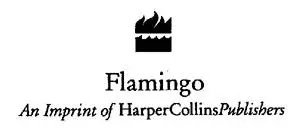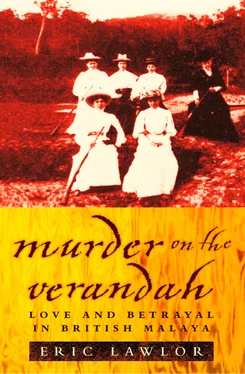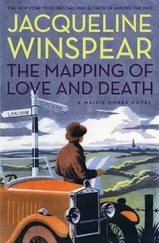Murder on the Verandah
ERIC LAWLOR
Love and Betrayal in British Malaya

Copyright Copyright Dedication Epigraph Preface I TRIALS 1 ‘Blood, blood. I’ve shot a man’ 2 To Hang by the Neck Till She Be Dead 3 A Profound Sensation 4 A Man on a Mission 5 The Role of a Lifetime II ETHEL’S WORLD 6 Foxtrots and Claret 7 ‘Kippers Always in Stock’ 8 Miss Aero and the Inimitable Denny 9 The Queen in her Garden 10 ‘Tragic Wives’ 11 Rubber Fever 12 The Imp of the Perverse 13 A Tory Eden 14 Against the Grain III HOME 15 The Vanishing Index Acknowledgements About the Author About the Publisher
Flamingo
An Imprint of HarperCollins Publishers 1 London Bridge Street, London SE1 9GF
Flamingo is a registered trade mark of
HarperCollins Publishers Limited
www.harpercollins.co.uk
Published by Flamingo 2000
First published in Great Britain by HarperCollins Publishers 1999
Copyright © Eric Lawlor 1999
The Author asserts the moral right to be identified as the author of this work
All rights reserved under International and Pan-American Copyright Conventions. By payment of the required fees, you have been granted the non-exclusive, non-transferable right to access and read the text of this ebook on-screen. No part of this text may be reproduced, transmitted, down-loaded, decompiled, reverse engineered, or stored in or introduced into any information storage and retrieval system, in any form or by any means, whether electronic or mechanical, now known or hereinafter invented, without the express written permission of HarperCollins.
HarperCollins Publishers has made every reasonable effort to ensure that any picture content and written content in this ebook has been included or removed in accordance with the contractual and technological constraints in operation at the time of publication.
Source ISBN: 9780006550655
Ebook Edition © MARCH 2015 ISBN: 9780007525881
Version: 2015-03-26
Dedication Dedication Epigraph Preface I TRIALS 1 ‘Blood, blood. I’ve shot a man’ 2 To Hang by the Neck Till She Be Dead 3 A Profound Sensation 4 A Man on a Mission 5 The Role of a Lifetime II ETHEL’S WORLD 6 Foxtrots and Claret 7 ‘Kippers Always in Stock’ 8 Miss Aero and the Inimitable Denny 9 The Queen in her Garden 10 ‘Tragic Wives’ 11 Rubber Fever 12 The Imp of the Perverse 13 A Tory Eden 14 Against the Grain III HOME 15 The Vanishing Index Acknowledgements About the Author About the Publisher
For Gully
Epigraph Epigraph Preface I TRIALS 1 ‘Blood, blood. I’ve shot a man’ 2 To Hang by the Neck Till She Be Dead 3 A Profound Sensation 4 A Man on a Mission 5 The Role of a Lifetime II ETHEL’S WORLD 6 Foxtrots and Claret 7 ‘Kippers Always in Stock’ 8 Miss Aero and the Inimitable Denny 9 The Queen in her Garden 10 ‘Tragic Wives’ 11 Rubber Fever 12 The Imp of the Perverse 13 A Tory Eden 14 Against the Grain III HOME 15 The Vanishing Index Acknowledgements About the Author About the Publisher
‘Coelum non animum mutant qui trans mare currunt’
‘The sky, but not the heart, they change who speed across the sea’
FROM HORACE, TRANSLATED BY H. DARNLEY NAYLOR
Cover
Title Page Murder on the Verandah ERIC LAWLOR Love and Betrayal in British Malaya
Copyright
Dedication
Epigraph
Preface
I TRIALS
1 ‘Blood, blood. I’ve shot a man’
2 To Hang by the Neck Till She Be Dead
3 A Profound Sensation
4 A Man on a Mission
5 The Role of a Lifetime
II ETHEL’S WORLD
6 Foxtrots and Claret
7 ‘Kippers Always in Stock’
8 Miss Aero and the Inimitable Denny
9 The Queen in her Garden
10 ‘Tragic Wives’
11 Rubber Fever
12 The Imp of the Perverse
13 A Tory Eden
14 Against the Grain
III HOME
15 The Vanishing
Index
Acknowledgements
About the Author
About the Publisher
On 23 April 1911, Ethel Proudlock, as was her custom on Sundays, attended Evensong at St Mary’s Church in Kuala Lumpur. She was well known at St Mary’s. From time to time she helped with jumble sales and had recently joined the choir. After the service, a friend invited Ethel to join her for dinner, but she declined. Her husband was going out for the evening, she said; it would give her a chance to write some letters. Then, after checking that the hymnals were in order, she walked home and killed her lover.
Claiming self-defence, she told police that William Steward had turned up unexpectedly that evening and tried to rape her. None of this was true. Steward was there because Mrs Proudlock had invited him, and he died – shot five times at point-blank range – after telling her he was ending their affair.
The Proudlock case, the basis of ‘The Letter’, the most famous of Somerset Maugham’s short stories, galvanized British Malaya. Some Britons insisted she was innocent, but the evidence against her was overwhelming and, after a trial lasting nearly a week, Ethel Proudlock was convicted of first-degree murder and sentenced to die. Preparations to hang her were well advanced when the Sultan of Selangor intervened. Citing her youth and the fact that she was a mother, he granted her a pardon. But the trial had unhinged her. Ordered to leave Malaya, Mrs Proudlock, with her husband and three-year-old daughter, returned to England a virtual invalid.
Until she was arrested, there was little to distinguish Ethel Proudlock from other members of the British community. Like them she was middle-class, seemed perfectly conventional and, to all appearances, was happily married. Ethel Proudlock fitted in, her defenders said. She couldn’t possibly be a killer; she was one of them. But the fact remained: Ethel Proudlock had killed. Why?
Some suggested that she might be mad. Mrs Proudlock was dangerously unstable, they said; a person whose violent mood-swings had long been the subject of gossip. Others blamed vindictiveness. Ethel made a bad enemy, according to this view. Offend her even slightly, and she was implacable. A third group – this one made up of Kuala Lumpur’s Chinese and Malays – attributed the killing to arrogance. Ethel was a member of Malay’s ruling caste and, as such, thought she could do as she pleased. When she pulled the trigger that night, she was exercising the prerogatives she believed were hers by virtue of her station.
There is a fourth, more plausible, possibility. When Ethel married, she was a girl of just nineteen whose sheltered background can hardly have prepared her for the pressures and artificialities of colonial life. Might it be the case that those pressures proved too much for her? Answering that question necessarily raises others. What were the British in Malaya really like? How did they comport themselves? Did they enjoy the country? What did they see as their role there? Were they, as some have claimed, a force for good? Or were they opportunists?
Colonial Malaya, often described as ‘Cheltenham on the equator’, has not lacked for study. Its politics have come in for much attention, as have its economics, but about the British themselves we know surprisingly little. The oversight is regrettable. While the society they created was neither as complex as India’s or nearly as grand, it was no less intriguing. No one clung more tenaciously to their ancestral ways than did the British in Malaya; and no one was more convinced of their natural superiority. The institutions they created in that country may well have been unique.
Читать дальше













